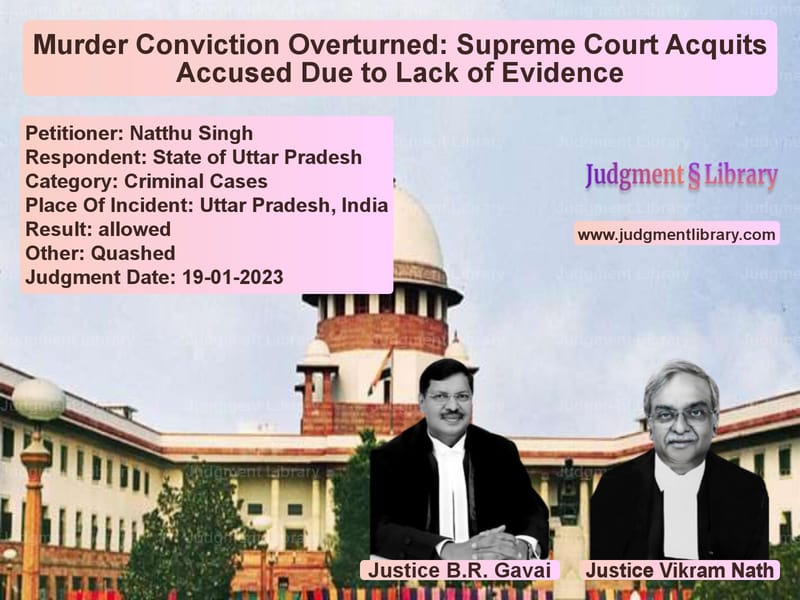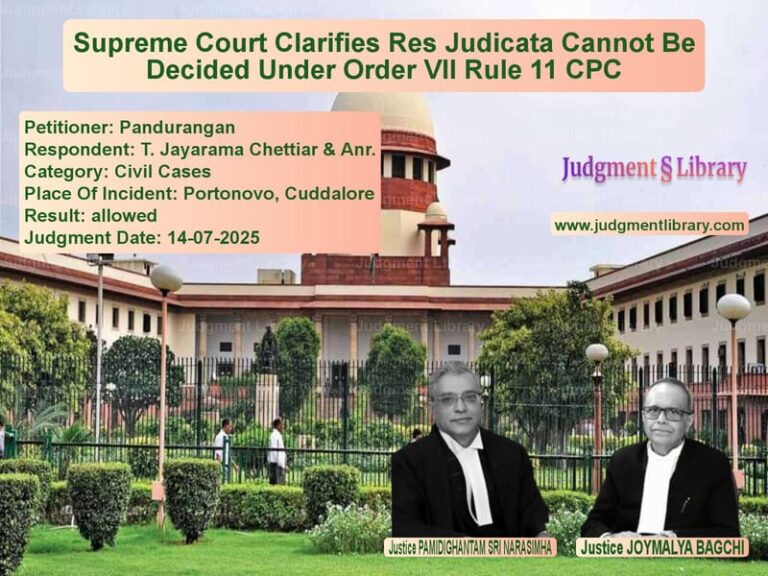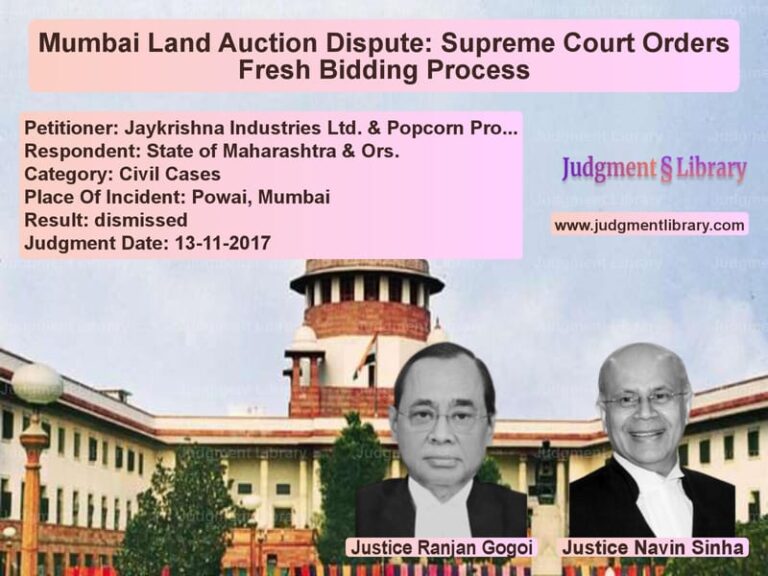Murder Conviction Overturned: Supreme Court Acquits Accused Due to Lack of Evidence
The case of Natthu Singh vs. State of Uttar Pradesh revolves around a long-standing murder conviction that was overturned by the Supreme Court due to inconsistencies in witness statements and lack of corroborative evidence. The Supreme Court, in its judgment dated January 19, 2023, set aside the life imprisonment sentence of the accused, ruling that the prosecution failed to establish guilt beyond a reasonable doubt.
Background of the Case
The appellant, Natthu Singh, was convicted along with another accused, Rajesh, for the murder of Vineet under Sections 302 and 34 of the Indian Penal Code (IPC). The case was based on the allegations that the accused surrounded the victim outside a local paan shop and that co-accused Rajesh fired the fatal shot at the instigation of Natthu Singh.
The trial court sentenced both accused to life imprisonment, and the Allahabad High Court upheld the conviction in its judgment dated April 25, 2019. The accused then appealed to the Supreme Court, arguing that the prosecution’s case was flawed due to unreliable witness testimony and procedural lapses.
Key Legal Issues
- Was the conviction based on credible and corroborated evidence?
- Did the delay in recording witness statements affect the reliability of the prosecution’s case?
- Should a conviction be sustained based on the sole testimony of a doubtful witness?
Arguments of the Appellant (Natthu Singh)
The appellant contended that:
- The prosecution relied on a single eyewitness, PW-3, whose testimony was inconsistent.
- There was an unexplained delay of two months in recording the statement of the sole eyewitness.
- Other eyewitnesses, including those named in the chargesheet, turned hostile and did not support the prosecution’s case.
- The investigating officer failed to provide reasons for the delay in recording statements, casting doubt on the entire investigation.
Arguments of the Respondent (State of Uttar Pradesh)
The prosecution argued that:
- The conviction was based on an eyewitness account (PW-3), which was detailed and credible.
- The previous conviction was upheld by both the trial court and the High Court, and there was no reason for the Supreme Court to intervene.
- Co-accused Rajesh’s appeal had already been dismissed by the Supreme Court, and therefore, the conviction of the appellant should also stand.
Supreme Court’s Observations
The Supreme Court, comprising Justice B.R. Gavai and Justice Vikram Nath, ruled that the conviction was unsustainable due to inconsistencies in the prosecution’s case.
“The inordinate delay in recording the statement of the sole eyewitness, coupled with the lack of any explanation for such delay, casts serious doubt on the prosecution’s version of events. Conviction on the sole testimony of such a witness, without corroboration, is not justified.”
Read also: https://judgmentlibrary.com/murder-conviction-upheld-supreme-court-ruling-in-john-anthonisamy-case/
The Court noted that the testimony of PW-3 was unreliable because:
- His statement was recorded two months after the incident with no justification for the delay.
- He initially stated that all accused surrounded the victim, but later changed his statement to say that only the victim was encircled.
- The paan shop owner, who was allegedly present at the scene, was never examined as a prosecution witness.
Final Judgment
The Supreme Court ruled that:
- The conviction of the appellant was set aside due to lack of reliable evidence.
- The appellant was granted benefit of doubt and acquitted of all charges.
- The appellant was directed to be released immediately, provided he was not required in any other case.
Implications of the Judgment
This ruling has significant implications:
- Strengthens the Requirement of Corroborative Evidence: Reinforces that courts must not convict based on a single witness if the testimony is doubtful.
- Emphasizes Timely Investigation: Highlights the need for prompt recording of witness statements to maintain credibility.
- Precedent for Criminal Appeals: Serves as a guiding case for future appeals involving weak prosecution cases.
Conclusion
The Supreme Court’s decision in Natthu Singh vs. State of Uttar Pradesh highlights the importance of credible witness testimony in criminal cases. By setting aside the conviction, the Court reinforced the principle that an accused cannot be convicted merely on a doubtful and uncorroborated statement. This judgment ensures that the justice system remains fair and that wrongful convictions based on unreliable evidence are rectified.
Petitioner Name: Natthu Singh.Respondent Name: State of Uttar Pradesh.Judgment By: Justice B.R. Gavai, Justice Vikram Nath.Place Of Incident: Uttar Pradesh, India.Judgment Date: 19-01-2023.
Don’t miss out on the full details! Download the complete judgment in PDF format below and gain valuable insights instantly!
Download Judgment: natthu-singh-vs-state-of-uttar-prade-supreme-court-of-india-judgment-dated-19-01-2023.pdf
Directly Download Judgment: Directly download this Judgment
See all petitions in Murder Cases
See all petitions in Bail and Anticipatory Bail
See all petitions in Attempt to Murder Cases
See all petitions in Judgment by B R Gavai
See all petitions in Judgment by Vikram Nath
See all petitions in allowed
See all petitions in Quashed
See all petitions in supreme court of India judgments January 2023
See all petitions in 2023 judgments
See all posts in Criminal Cases Category
See all allowed petitions in Criminal Cases Category
See all Dismissed petitions in Criminal Cases Category
See all partially allowed petitions in Criminal Cases Category







